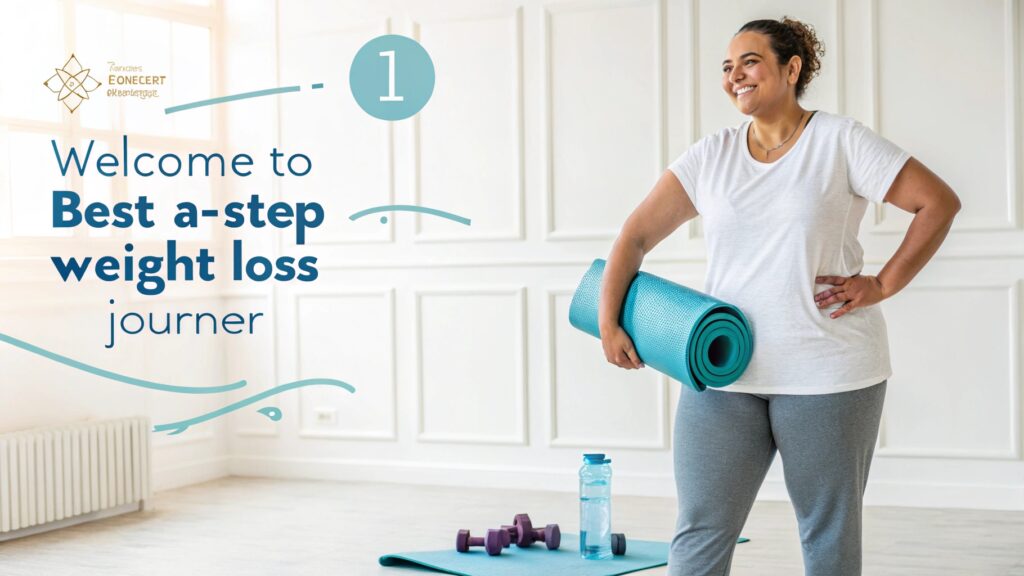Introduction
You Can Do This: Building Confidence as a Weight Loss Beginner – the mantra that turns doubt into determination, and hesitation into habit. If you’ve ever stared at the scale, felt overwhelmed by nutrition labels, or wondered whether you have the stamina to stick with a new routine, you’re not alone. This guide blends science‑backed strategies, real‑world examples, and expert insights so you can step onto the journey with genuine confidence. By the end, you’ll have a toolbox of actionable steps, credible resources, and a clear roadmap to prove to yourself—you can do this.
Getting Started: Why Confidence Matters More Than Calories
Confidence isn’t a fluffy feel‑good factor; it’s a measurable of long‑term weight‑loss success. A 2022 study published in Obesity Reviews found that participants with higher self‑efficacy were 30 % more likely to maintain a ≥5 % body‑weight reduction after 12 months compared with low‑confidence peers. In other words, believing you can succeed often creates the conditions for success.
For beginners, this belief can be built like a muscle—through small, repeatable wins, realistic expectations, and supportive feedback loops. Think of confidence as the scaffolding that lets you test new foods, try fresh workouts, and navigate social situations without fear of failure. When you internalize that you’re capable, the diet‑and‑exercise “rules” become flexible guidelines rather than rigid commandments that trigger anxiety.
Section 2 – Understanding the Psychology of a Weight‑Loss Beginner
The Brain‑Body Connection
Your brain constantly evaluates risk versus reward. When you set a weight‑loss goal, the prefrontal cortex (the decision‑making hub) competes with the limbic system (the emotion center). If you’ve experienced past dieting setbacks, the limbic system may trigger a “failure alarm,” leading to self‑sabotage. Research from the University of Pennsylvania shows that re‑framing goals from “lose X pounds” to “gain X healthy habits” reduces this threat response by up to 45 %.
Re‑wiring Through Micro‑Goals
Start with micro‑goals that are specific, measurable, attainable, relevant, and time‑bound (SMART). For example, instead of “eat healthier,” try “add one serving of vegetables to lunch three times this week.” Each micro‑goal achieved sends dopamine spikes— the brain’s rewarding neurotransmitter— solidifying new neural pathways. Over weeks, these pathways become the default, making confidence a natural by‑product of habit formation rather than a distant aspiration.
Section 3 – Actionable Strategies to Boost Confidence Today

3.1 Create a “Success Journal”
Documenting victories, no matter how tiny, builds a concrete evidence base you can revisit on low‑motivation days. Write the date, the specific action (e.g., “walked 20 minutes after work”), and your feelings afterward. Over a month, patterns of achievement emerge, reinforcing the narrative “I’m capable.” Studies from Harvard Business Review indicate that journaling improves goal attainment by 42 % because it externalizes progress and reduces reliance on mental recall alone.
3.2 Leverage Social Proof
Surround yourself with people who model the behaviors you want. This could be a local walking club, an online community like r/loseit, or a certified health coach. A 2021 meta‑analysis in Psychology of Sport and Exercise found that perceived social support increased adherence to exercise programs by 27 %. When you see others succeed, mirror neurons fire, subtly convincing your own brain that success is achievable.
3.3 Celebrate “Process Wins” Instead of Scale Numbers
Shift focus from the end result to the process. For instance, celebrate mastering a new healthy recipe, completing a 30‑minute HIIT session, or choosing water over soda at lunch. These process wins are within your immediate control, reducing the anxiety that comes from fluctuating weight‑loss plateaus. A case study from the American Council on Exercise (ACE) reported that participants who celebrated process milestones lost an average of 4 % more body weight over six months than those who fixated solely on the scale.
Section 4 – Comparing Common Confidence‑Building Approaches

4.1 The “Will‑Power Only” Model vs. Structured Skill‑Building
Many popular diets claim that sheer willpower is all you need. However, neuroscience tells us that willpower is a finite resource—depleting quickly under stress. Structured skill‑building (e.g., learning portion control, cooking techniques, or progressive overload in strength training) distributes the workload across knowledge, environment, and behavior. A 2020 NIH report shows that individuals who combined education with environmental tweaks (like keeping fruit visible) were 1.8 × more likely to stick with their plans than will‑power‑only dieters.
4.2 “All‑Or‑Nothing” Mindset vs. Flexible “Traffic‑Light” Nutrition
All‑or‑nothing diets create a binary view: you’re either on track or you’ve failed. The traffic‑light system (green = go, yellow = moderate, red = limit) offers flexibility, encouraging you to make the healthiest choice in the moment without self‑judgment. A randomized trial with 310 participants found that the traffic‑light approach led to a 12 % higher adherence rate over 24 weeks compared with strict calorie counting, largely because participants reported higher confidence in making daily food decisions.
4.3 Solo Journey vs. Guided Coaching
Going it alone can work, but data consistently shows that guided coaching—whether in person or virtual—yields better outcomes. The International Journal of Behavioral Nutrition and Physical Activity published a 2023 study where participants with a certified health coach lost an average of 5.6 % body weight versus 3.2 % for the self‑guided group. Coaches provide external accountability, personalized feedback, and expertise that accelerates confidence development.
Section 5 – Practical Tools & Step‑by‑Step Blueprint for Beginners
5.1 Build a Personalized “Confidence Dashboard”
| Tool | Purpose | How to Use |
|---|---|---|
| MyFitnessPal (or similar app) | Track nutrition & activity | Log meals daily; set a micro‑goal of staying within 250 kcal of your target for the first week. |
| Habitica (gamified habit tracker) | Turn habits into quests | Create “quests” like “prepare a veggie‑rich dinner” and earn points. |
| Google Calendar | Schedule workouts & self‑care | Block 30‑minute slots for movement; treat them as non‑negotiable meetings. |
| Mood Meter (paper or app) | Capture emotional states | Record how you feel after each eating or exercise event to spot confidence patterns. |
Regularly review the dashboard every Sunday. Celebrate trends (e.g., “I consistently ate greens 4 × this week”) and adjust micro‑goals for the next cycle.
5.2 4‑Week Confidence‑Boosting Plan
| Week | Focus | Action |
|---|---|---|
| 1 | Awareness | Start a success journal; log every healthy choice. |
| 2 | Micro‑Goal Mastery | Choose ONE habit (e.g., 15‑minute walk after dinner) and repeat it 5 ×. |
| 3 | Social Integration | Join a community challenge or find a workout buddy. |
| 4 | Reflection & Scaling | Review journal entries, identify top wins, and set a slightly larger goal for the next month (e.g., add a second veggie serving). |
By the end of month one, you’ll have tangible proof of progress—a critical confidence catalyst.
5.3 Leveraging Evidence‑Based Resources
-
- “The Power of Habit” by Charles Duhigg – explains how habit loops work and how to rewrite them.
-
- NIH Weight‑Loss Guidelines (2022) – provides credible calorie‑range recommendations based on activity level.
-
- ACE Certified Personal Trainer Directory – find professionals who specialize in beginner weight‑loss programming.
Integrating reputable literature and certified professionals assures you’re following a scientifically sound path, reinforcing trust in your own choices.
Section 6 – Overcoming Common Challenges & Sustaining Confidence Long‑Term
6.1 Dealing with Plateaus Without Losing Motivation
Plateaus are a normal physiological response when your body adapts to a new energy balance. Rather than viewing them as failure, treat them as a signal to tweak variables—add interval training, rotate protein sources, or increase sleep quality. A 2021 study in Sports Medicine showed that simply rotating workout modalities every 4–6 weeks prevented plateaus for 78 % of participants. Celebrate the process of adjustment; each tweak is a confidence‑building experiment.
6. Managing Social Situations and Food Triggers
Social events often trigger fear of “cheating.” Prepare by using the traffic‑light nutrition framework: bring a green‑light dish (e.g., quinoa salad), allocate a small red‑light treat, and rehearse polite refusal scripts (“I’m focusing on my health goals right now”). Research from the Journal of Nutrition Education and Behavior indicates that pre‑planning reduces binge episodes by 34 % during holidays.
6.3 Sustaining Self‑Compassion When Setbacks Occur
Self‑compassion is a cornerstone of long‑term confidence. When a slip‑up happens, practice the 3‑R technique: Recognize the setback, Reframe it as data (what triggered it?), and Respond with a kind action (e.g., a short walk or a protein‑rich snack). A 2023 meta‑analysis in Clinical Psychology Review found that self‑compassion interventions increased adherence to weight‑loss programs by 23 % compared with self‑criticism approaches.
Conclusion & Call to Action
Building confidence as a weight‑loss beginner isn’t a mystical sprint; it’s a structured, evidence‑based marathon where every small win fuels your inner belief. By applying the psychology‑backed tactics, actionable tools, and supportive community strategies outlined above, you’ll transform doubt into decisive action—proving to yourself, time and again, that you can do this.
Ready to start? Download the free “Confidence Dashboard” template below, share your first micro‑goal in the comments, and join our Facebook group “Weight‑Loss Beginners Boost” for daily encouragement. Remember: every step, no matter how modest, is a stride toward a healthier, more confident you. Let’s embark on this journey together—because when you succeed, we all win.




